Key takeaways
- Geocaching enhances family bonding by promoting teamwork and shared adventures, transforming routine outings into exciting explorations.
- This activity fosters children’s curiosity and learning about nature, blending education with fun through hands-on experiences.
- Proper preparation, including safety measures and choosing suitable caches, ensures a positive geocaching experience for families.
- Geocaching instills respect for nature in children, teaching them stewardship through active participation in outdoor adventures.
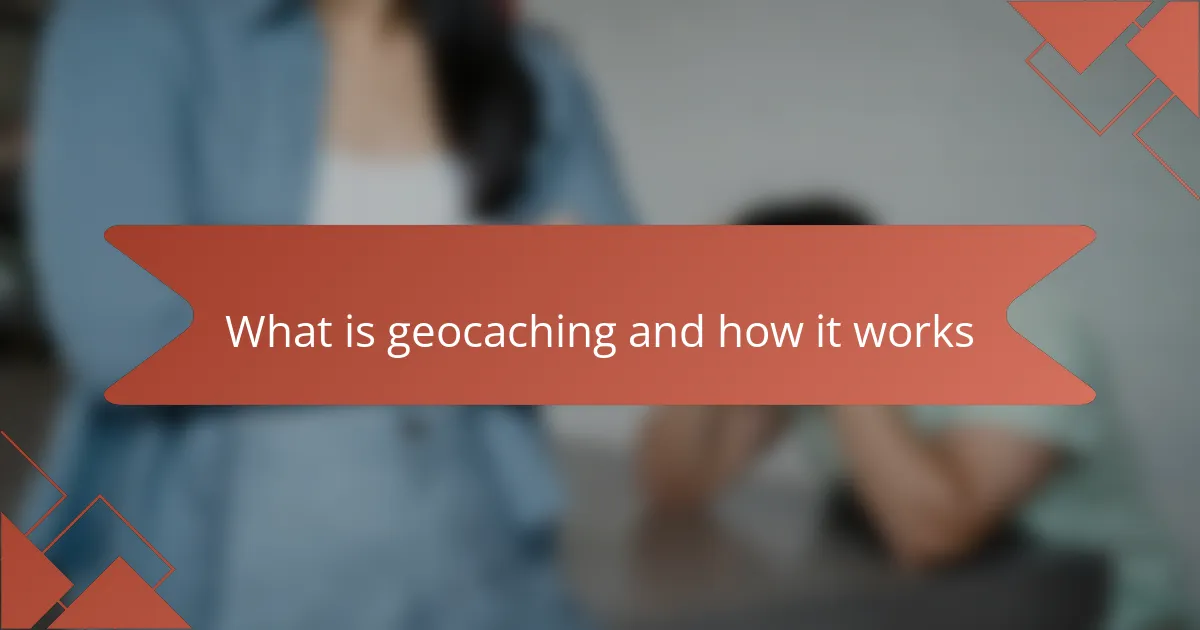
What is geocaching and how it works
Geocaching is like a modern-day treasure hunt using GPS technology. You use a smartphone or GPS device to find hidden containers, called caches, at specific coordinates shared online. Have you ever wondered how simple it is to turn a walk in the park into an exciting adventure?
When we first tried geocaching, I was amazed at how it transformed our usual routine into something magical. The idea of following clues and searching for a hidden box sparked curiosity not just in my kids, but in me as well. It’s fascinating how this activity combines technology and nature in such an accessible way.
The caches themselves usually contain a logbook to sign and sometimes small trinkets to swap. This simple exchange creates a sense of connection with other adventurers around the world. It made me realize how a little bit of exploration can open up so many possibilities for family fun and learning.
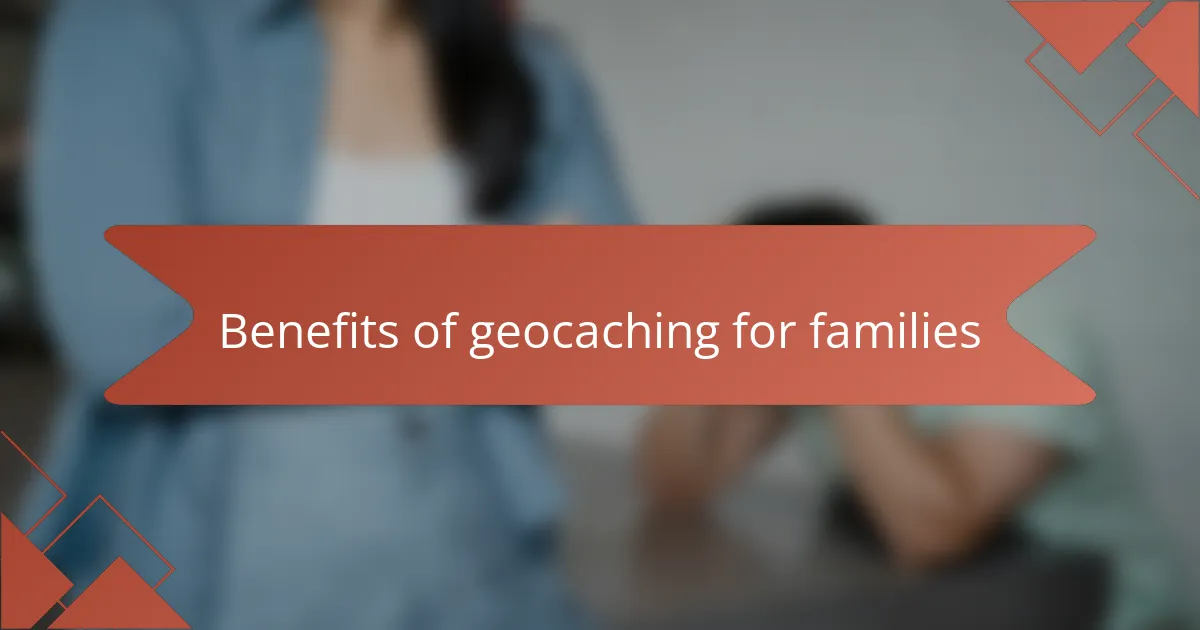
Benefits of geocaching for families
One of the biggest benefits I noticed right away is how geocaching naturally brought us closer as a family. Instead of everyone being glued to their screens or doing separate activities, we had a common goal to focus on. It felt like we were all on a little mission together, and that shared excitement created memories I know my kids will cherish.
Geocaching also sparked my children’s curiosity about the world around them. Have you ever seen a child light up when they discover something hidden or unexpected? That moment of finding a cache brought out their wonder for nature in a way casual walks never did. It encouraged questions, observations, and even taught them how to use a GPS, blending learning with adventure effortlessly.
Finally, I appreciated how this activity gently nudged us outdoors, no matter the weather or season. When you’re chasing coordinates, you don’t think twice about putting on boots in the rain or jackets in the fall. It turned being outside from a chore into pure fun and exploration, helping us appreciate the simple beauty of nature while staying active together.
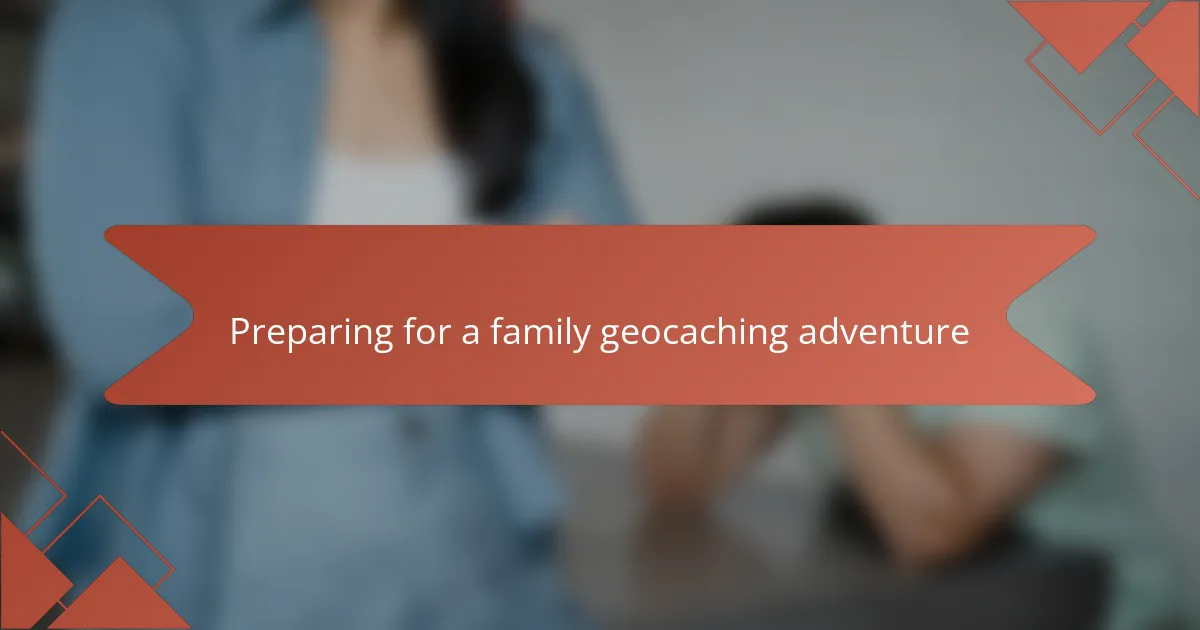
Preparing for a family geocaching adventure
Getting ready for our first geocaching trip felt like preparing for a mini-expedition. I made sure we had sturdy shoes, weather-appropriate clothes, and plenty of snacks, because I quickly learned that hungry kids don’t make for happy explorers. Have you ever tried convincing your kids to keep hiking when their energy is low? That’s where a well-packed backpack becomes your best friend.
I also took some time to download maps and caches onto my phone ahead of time, so we wouldn’t get stuck without signal in the woods. Preparing this way gave me peace of mind and kept the focus on fun rather than frustration. It made me realize how a little planning can turn potential tech headaches into smooth sailing.
Finally, we talked as a family about teamwork and safety before heading out. I explained why it’s important to stick together and respect nature, and this turned into a great chance for my kids to ask questions and feel involved. Don’t you find that when kids understand the “why” behind the rules, they’re much more eager to follow them? This simple conversation set the tone for our adventure and helped everyone feel confident.
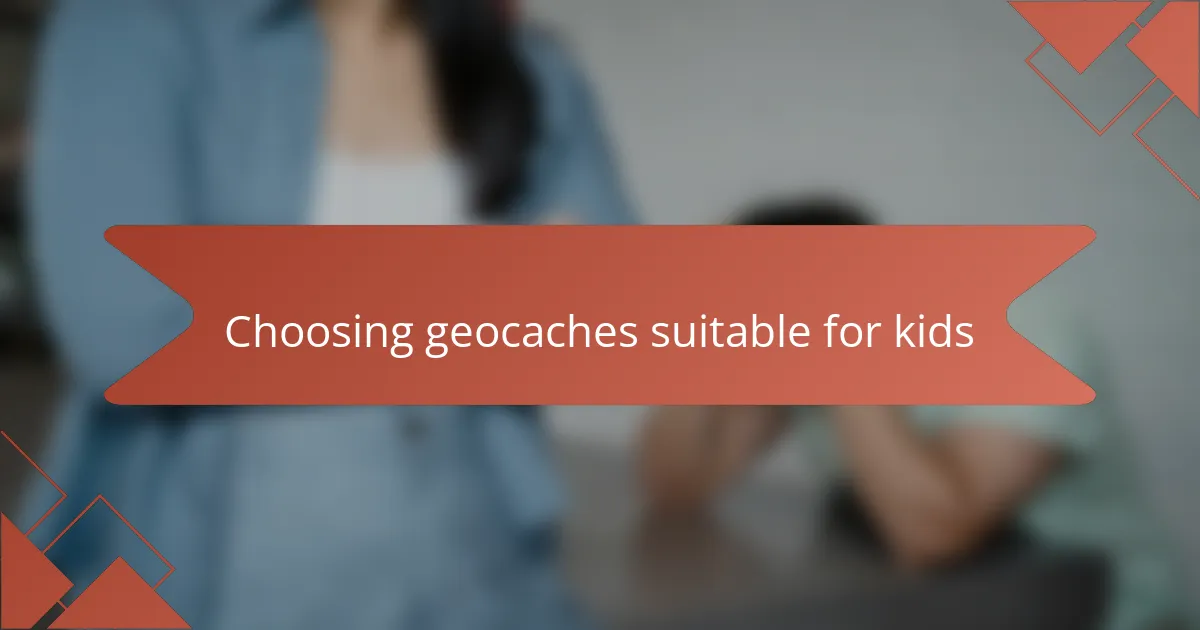
Choosing geocaches suitable for kids
Choosing geocaches that are kid-friendly made a huge difference in keeping my children engaged and excited. I always look for caches with a lower difficulty rating and those hidden in safe, accessible spots—like easy trails or parks close to home. After all, what’s the point of an adventure if it ends in frustration or exhaustion?
One time, I picked a cache that required some minor climbing, thinking it would be a fun challenge. Big mistake. My youngest got discouraged quickly, and the mood shifted from eager to grumpy. That taught me the importance of knowing my kids’ limits and choosing geocaches that match their abilities and interests. Have you ever noticed how a simple win boosts children’s confidence and hunger for the next challenge?
Another tip I swear by is reading the cache descriptions carefully. They often include clues about terrain and size, which helps me decide if it’s a good fit. Sometimes, I even let my kids help choose caches, turning it into a mini planning session that builds excitement before we even leave the house. It’s become part of our ritual, making the whole experience feel like a team effort.
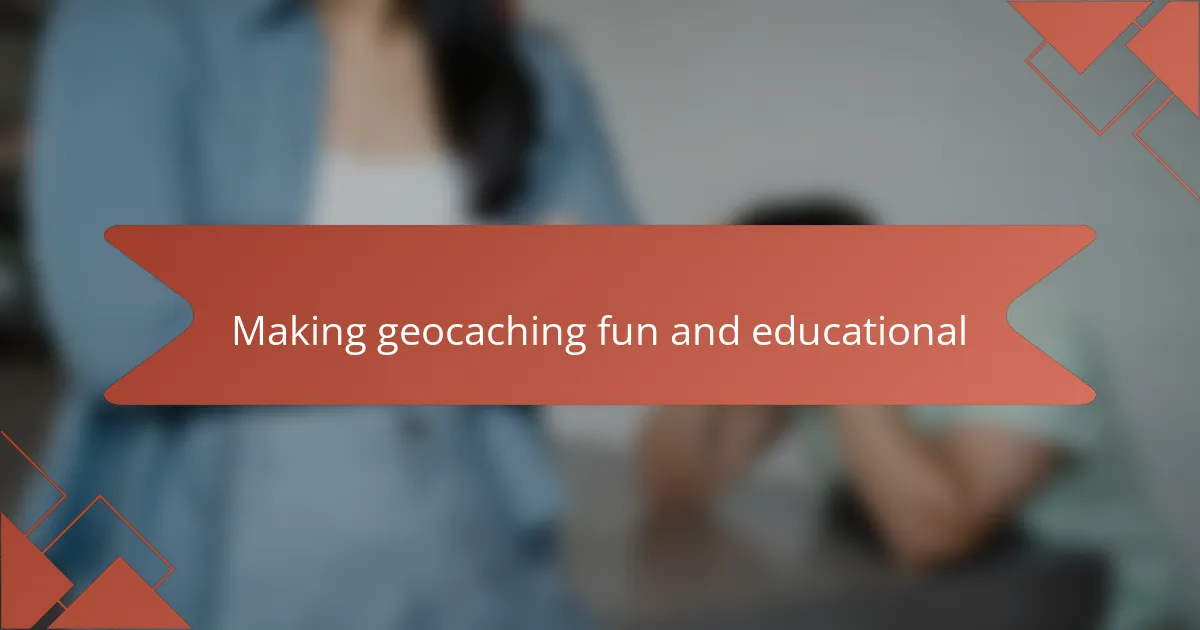
Making geocaching fun and educational
Making geocaching both fun and educational comes down to mixing play with learning in a way that feels natural. I found that turning every adventure into a game of clues and discovery got my kids thinking without them even realizing they were learning. Have you ever watched a child’s eyes light up when they not only find a cache but also figure out how the coordinates led them there? That moment is pure magic.
I like to sneak in little lessons about nature during our hunts—pointing out different plants, telling stories about animals we might see, or explaining why certain spots are perfect hiding places. It’s amazing how curiosity blooms when you connect facts to real experiences outdoors. Plus, it makes each geocache hunt feel like a mini science class that doesn’t involve a desk or textbook.
We also turn geocaching into a scavenger hunt for new skills, like using a compass or reading a map. Sometimes it feels like I’m coaching a young explorer, cheering on every small win. Do you think kids learn best when they’re having fun? I certainly do, and geocaching has been one of the best ways I’ve found to prove that.
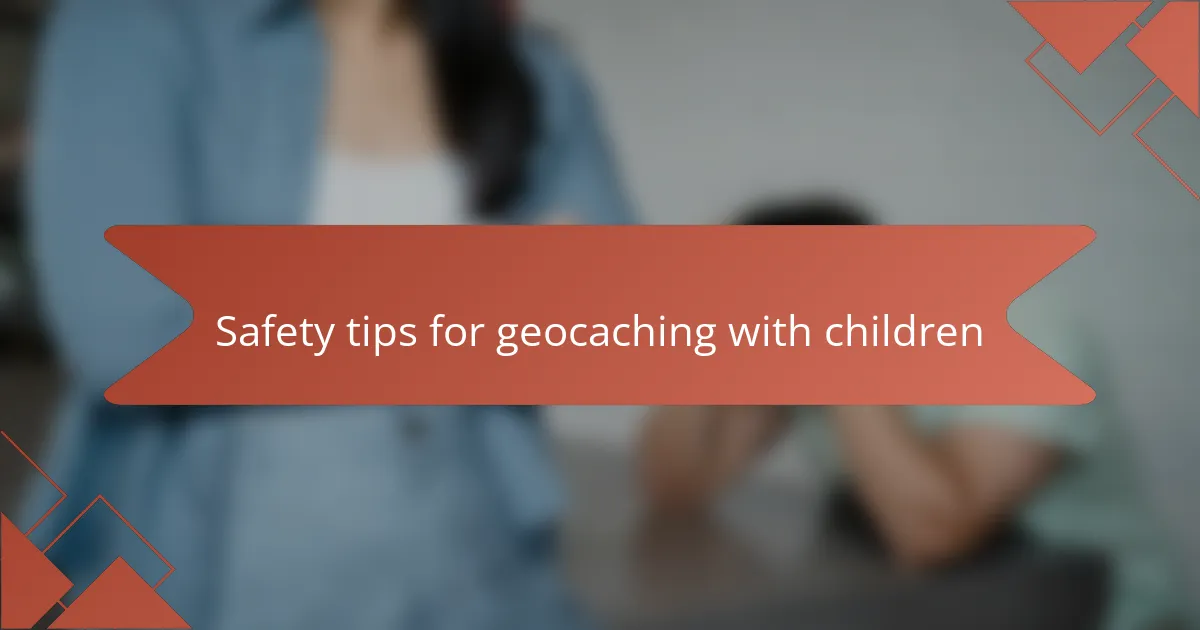
Safety tips for geocaching with children
One thing I quickly learned is to always keep a close eye on my kids during the hunt. Even small trails can have slippery spots or unexpected obstacles, so staying within arm’s reach gave me peace of mind and kept us all safe. Have you ever noticed how little ones can disappear like magic when their focus shifts? Having a clear “stay close” rule became our go-to safety mantra.
I also made sure to pack a basic first aid kit, which proved to be a lifesaver when my son scraped his knee on a hidden root. It reminded me that a little preparation goes a long way in preventing a minor mishap from turning into a meltdown. Plus, we always checked weather forecasts and dressed accordingly, because no adventure is fun with soggy shoes or sunburns.
Finally, I set boundaries about which areas were off-limits—like private properties or dense brush—before we even started. Explaining why certain spots weren’t safe made sense to my kids, and it helped prevent any scary “what-if” moments. Don’t you find that when kids understand the reasons behind rules, they’re more likely to respect them? It certainly made our outings smoother and more enjoyable.
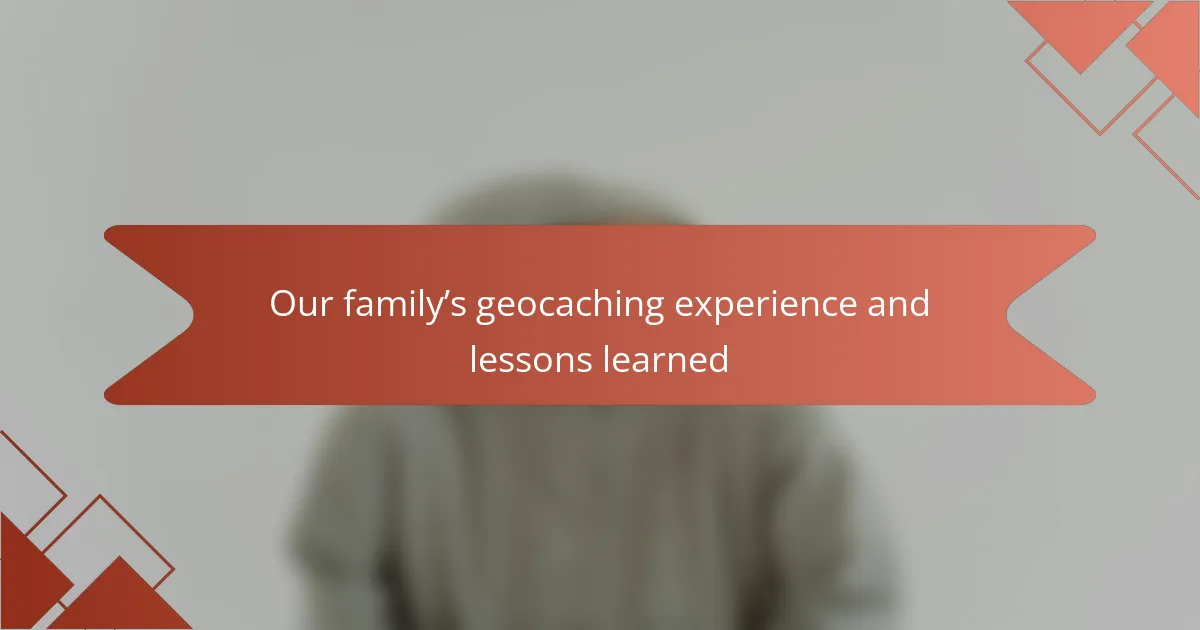
Our family’s geocaching experience and lessons learned
Our family’s geocaching experience quickly showed me how much teamwork matters. I remember one afternoon when my youngest was ready to give up after a tricky clue, but seeing everyone rally together to encourage him made all the difference. Have you ever witnessed how a shared challenge can bring a family closer? For us, those moments became some of the most rewarding parts of the adventure.
Along the way, I learned that patience is key—both with the GPS technology and with my kids’ varying energy levels. Sometimes, getting a bit lost or having to backtrack tested my own calm, but it taught me to celebrate the journey rather than just the destination. Do you think a little unpredictability can sometimes make memories more meaningful? I certainly believe so, as it gave us stories to laugh about later.
One lesson that surprised me was how geocaching encouraged my kids to respect nature deeply. Not simply as a backdrop, but as an active part of our game to protect. After all, when you’re searching carefully around trees and under rocks for a hidden cache, it’s hard not to feel a sense of responsibility. Have you noticed that hands-on experiences often make lessons stick better than words alone? That’s something I’ve come to appreciate immensely.